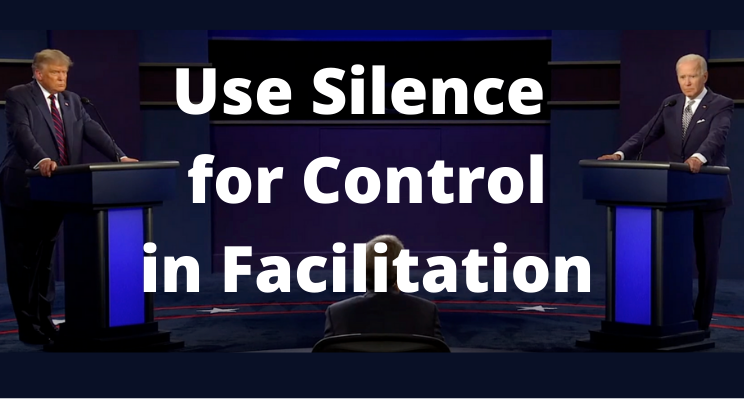What can a facilitator do with an extremely persistent person, who refuses to stop interrupting others in mediating or facilitating? In my last post I stressed the importance of stepping up early in proceedings to establish that groundrules must be kept. Jump on any first violations and then relax a bit later, not the other way around.
Several readers pointed out that in the situation I was referring to, the interrupter would probably not have been restrained by such facilitator efforts. Very possible. So we have to ask, what then?
Of course, it is always an option to simply close a fraught session. I am more effective as a facilitator when I am prepared to bring closure gracefully at any time. I will mention closure as a possibility to parties if necessary, for the threat of it often changes their behavior. But I need to mean it and be prepared to smoothly execute it in order for the specter of closure to have real impact on parties.
But closure is closure. It is not a tool for changing the dynamics of the meeting we are in. As a facilitator, I am prepared for closure but I want to maximize all possibilities for transforming this into a rule-governed exchange.
There is a powerful tool that facilitators can deploy to great benefit: strategic use of silence. Veteran teachers knew this long ago; the rest of us have to work on it!
One use of silence is simply to interject it in exchanges with disputants: “Mr. Interrupter, (silence for 2-3 full seconds, with steady but non-aggressive gaze directed his way), I need to ask you to observe the ground rule that has been established for this debate, not to speak when it is not your turn.” And then proceed with the debate.
I would try that, but I am not so hopeful that it would have had a great impact here. In this situation I think I would then have followed up by using silence in the following way: “Mr. Interrupter, the terms of this debate include a ground rule not to interrupt when the other person is speaking. It’s my duty to you and to those observing to ensure that ground rules are followed. You seem to be having a great deal of difficulty with this. I need to ask you now to recommit to it so that we can continue, and if you cannot, I will be compelled to call a pause in this conversation. Please, take a few seconds in silence and think about this. And then I’d like to hear your reply. “
I would then immediately busy myself with things on my desk for a few seconds – before turning back to the offender with, “Sir, are you ready to proceed with the ground rules as agreed?”
I would not allow the offender to ignore the question. If he refuses to give clear assent, I would call a short break to give everyone a chance to calm down. In the break I would try to interact briefly with both sides, and make a decision about whether and how to proceed based on my reading of those conversations.
There’s no guarantee this will work, of course, and if an offender refuses to observe ground rules, the facilitator has a duty to end the session. But when we do that, we want to do it in a way that: 1) Conspicuously provides maximum opportunity for the offender to first accept compliance with ground rules and 2) If the meeting must be ended, leaves no ambiguity that it was failure of the participant to observe ground rules that brought the meeting to a close.
The approach outlined above narrows down the possibility of proceeding to compliance of the offender with ground rules. It will be apparent to all present who is at fault. The offender knows this and only the most brazen will so clearly designate himself as the one who failed to cooperate.
If the offender persists, then the facilitator can calmly, confidently, regretfully but without a trace of spite, announce that it seems clear that the proceedings cannot proceed at this time and bring things to a close.


